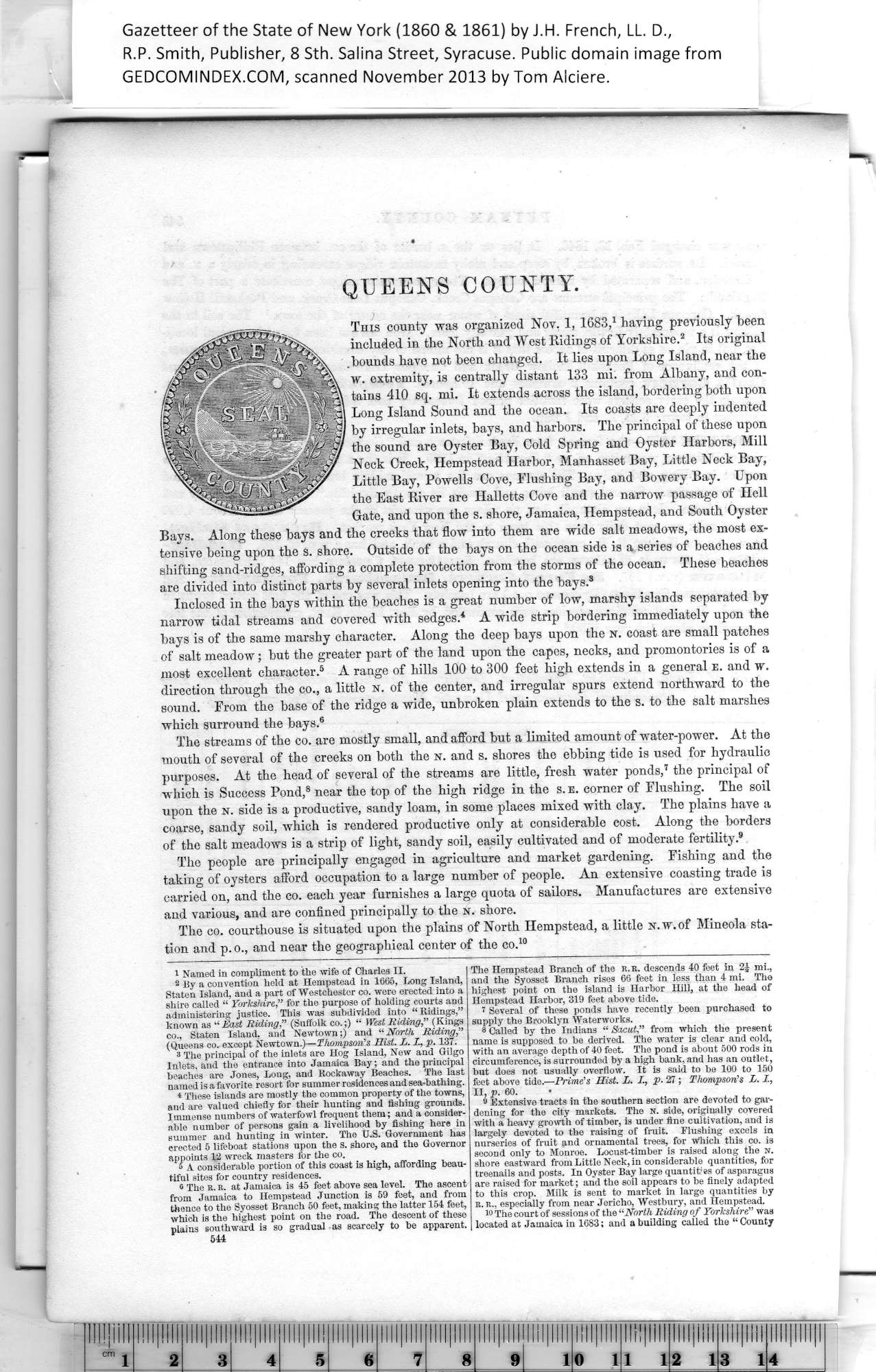|
QUEENS COUNTY.
This county was organized Nov. 1, 1683,1 having previously been
included in the North and West Ridings of Yorkshire.2 Its original
.bounds have not been changed. It lies upon Long Island, near the
w. extremity, is centrally distant 133 mi. from Albany, and con¬
tains 410 sq. mi. It extends across the island, bordering both upon
Long Island Sound and the ocean. Its coasts are deeply indented
by irregular inlets, bays, and harbors. The principal of these upon
the sound are Oyster Bay, Cold Spring and Oyster Harbors, Mill
Neck Creek, Hempstead Harbor, Manhasset Bay, Little Neck Bay,
Little Bay, Powells Cove, Flushing Bay, and Bowery Bay. Upon
the East River are Halletts Cove and the narrow passage of Hell
Gate, and upon the s. shore, Jamaica, Hempstead, and South Oyster
Bays. Along these bays and the creeks that flow into them are wide salt meadows, the most ex¬
tensive being upon the s. shore. Outside of the bays on the ocean side is a series of beaches and
shifting sand-ridges, affording a complete protection from the storms of the ocean. These beaches
are divided into distinct parts by several inlets opening into the bays.3
Inclosed in the bays within the beaches is a great number of low, marshy islands separated by
narrow tidal streams and covered with sedges.2 A wide strip bordering immediately upon the
bays is of the same marshy character. Along the deep bays upon the n. coast are small patches
of salt meadow; but the greater part of the land upon the capes, necks, and promontories is of a
most excellent character.3 A range of hills 100 to 300 feet high extends in a general e. and w.
direction through the co., a little n. of the center, and irregular spurs extend northward to the
sound. From the base of the ridge a wide, unbroken plain extends to the s. to the salt marshes
which surround the bays.4
The streams of the co. are mostly small, and afford but a limited amount of water-power. At the
mouth of several of the creeks on both the n. and s. shores the ebbing tide is used for hydraulic
purposes. At the head of several of the streams are little, fresh water ponds,7 the principal of
which is Success Pond,5 near the top of the high ridge in the s. e. corner of Flushing. The soil
upon the n. side is a productive, sandy loam, in some places mixed with clay. The plains have a
coarse, sandy soil, which is rendered productive only at considerable cost. Along the borders
of the salt meadows is a strip of light, sandy soil, easily cultivated and of moderate fertility.9
The people are principally engaged in agriculture and market gardening. Fishing and the
taking of oysters afford occupation to a large number of people. An extensive coasting trade is
carried on, and the co. each year furnishes a large quota of sailors. Manufactures are extensive
and various, and are confined principally to the n. shore.
The co. courthouse is situated upon the plains of North Hempstead, a little n.w.of Mineola sta¬
tion and p. o., and near the geographical center of the co.6
|
The Hempstead Branch of the r.r. descends 40 feet in 2| mi.,
and the Syosset Branch rises 66 feet in less than 4 mi. The
highest point on the island is Harbor Hill, at the head of
Hempstead Harbor, 319 feet above tide.
7 Several of these ponds have recently been purchased to
supply the Brooklyn Waterworks.
8 Called by the Indians “ Sacut,” from which the present
name is supposed to be derived. The water is clear and cold,
with an average depth of 40 feet. The pond is about 500 rods in
circumference, is surrounded by a high bank, and has an outlet,
but does not usually overflow. It is said to be 100 to 150
feet above tide.—Prime’s Hist. L. I., p. 27; Thompson’s L. I.,
II, p. 60.
9 Extensive tracts in the southern section are devoted to gar¬
dening for the city markets. The N. side, originally covered
with a heavy growth of timber, is under fine cultivation, and is
largely devoted to the raising of fruit. Flushing excels in
nurseries of fruit and ornamental trees, for Which this co. is
second only to Monroe. Locust-timber is raised along the N.
shore eastward from Little Neck, in considerable quantities, for
treenails and posts. In Oyster Bay large quantities of asparagus
are raised for market; and the soil appears to be finely adapted
to this crop. Milk is sent to market in large quantities by
r. r., especially from near Jericho, Westbury, and Hempstead.
10 The court of sessions of the “North Riding of Yorkshire” was
located at Jamaica in 1683; and a building called the “ County |
1
Named in compliment to the wife of Charles II.
2
These islands are mostly the common property of the towns,
and are valued chiefly for their hunting and fishing grounds.
Immense numbers of waterfowl frequent them; and a consider¬
able number of persons gain a livelihood by fishing here in
summer and hunting in winter. The U.S. Government has
erected 5 lifeboat stations upon the s. shore, and the Governor
appoints 12 wreck masters for the co.
3
A considerable portion of this coast is high, affording beau¬
tiful sites for country residences.
4
The R. R. at Jamaica is 45 feet above sea level. The ascent
from Jamaica to Hempstead Junction is 59 feet, and from
5
which is the highest point on the road. The descent of these
6
544
|
